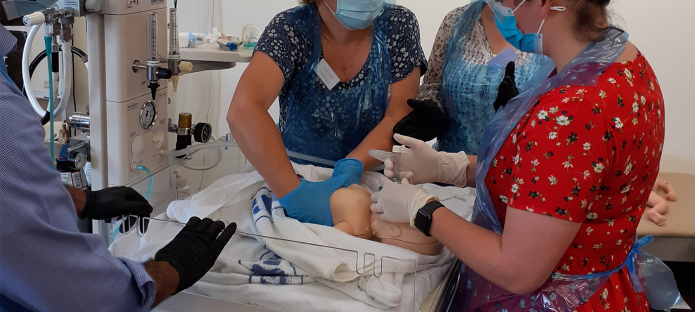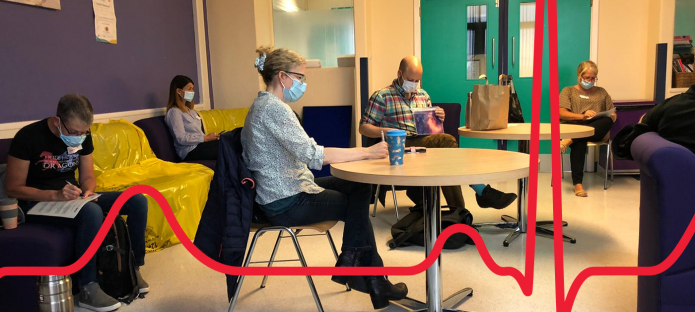
Sheffield Teaching Hospitals successfully facilitated two e-ALS courses at the end of October 2020. James Bolton (Course Director) explains how the course was modified and adapted to ensure social distancing was followed for the safety of everyone involved.
Prior to the course
ALS was classed as “business critical,” providing appropriate risk assessments and COVID-19 safety precautions were adhered to throughout. James utilised the RCUK Top Tips for running Resuscitation Council UK courses and reduced the numbers of Candidates from their standard 24-30 to 16 over four Candidate rooms. The Candidate rooms were specifically chosen due to their large size to accommodate the four Candidates, three rotational Instructors, a resuscitation trolley and manikin.
From a COVID-19 precautions perspective
The resuscitation trolley contents were reduced to just the essentials. Normally they would use a replicated real resuscitation trolley with everything in it (albeit out of date) but from looking at previous simulations, the team found that only certain kit was used. This reduction in trolley contents helped with the decontamination of the contents after the course.
The trolleys were stripped and cleaned and put back together prior to the course. The manikins were cleaned and the foam legs removed (as they were very difficult to clean). All surfaces were wiped down with their Trust approved antiviral spray in the Candidate rooms prior to the start of the course, and the allocated Candidates arrived at the venue and went straight into the room where they would stay until the end of the course.
On their usual pre-COVID-19 courses, the Course Director would do the introductions and run the demo - but for this course, the Instructors did the introductions, demo (in the form of the RCUK online video) and played a Trust COVID-19 precautions presentation in their mentor group rooms in order to avoid a large gathering in a lecture theatre. This worked very well, and the Instructors were happy delivering this.
PPE and cleaning kits were provided in each room and the Instructor who was not directly involved in the session would clean the kit and manikin whilst the learning conversation was happening. Candidate chairs were located two metres apart and social distancing was maintained throughout.
During the course
All Candidates and faculty were happy to wear the PPE as this is the level being used within the Trust. A good supply of aprons, gloves, visors, gel and access to several washbasins was available to Candidates and faculty. Faculty rotated so that only two individuals taught at any one time and a “wobble room” was allocated for use to de-stress if needed - but thankfully it wasn’t used!
Course Director James Bolton regularly entered rooms to observe Candidates and keep an eye on quality assurance at times during the day. He also took the step of asking an Instructor not currently directly involved with the teaching to step outside at the time to keep room numbers low.
Break times were facilitated by drinks being brought into the Candidate rooms and dinner was provided by an external firm making individual meals from a menu that all present could book from in the week prior to the course. The faculty had their dinner in the faculty room, and any feedback required after a dinner time faculty meeting could be fed back to the Candidate group while still maintaining safe room numbers.
Having smaller groups meant that the Candidates had more practise and this was well received in the feedback. They also ensured that during the scenarios, Instructors would keep their distance from the Candidates so as not to crowd the learning space.
For the testing
Sheffield Teaching Hospitals’ e-ALS course had three testing rooms with four Instructors in each room. Initially, three Candidates entered into the rooms for testing and three would remain outside until it was their turn.
The remaining 10 Candidates did their MCQ and, once finished, would wait in a spare room with drinks provided and enough space to socially distance. A helper collected the MCQ scores so that when the Candidate had finished their practical test, they could be given their scores and then depart. We decided not to have a final get together “thank you” in order to reduce large numbers in one space.
If any Candidates were nominated for IP, they were emailed the standard letter after the course.
Feedback
Everyone passed - and the feedback was very positive.
“The main question I asked the Candidates just before they left was to put in the feedback how safe they felt about out COVID-19 precautions,” says Course Director James. “They all felt safe, so I am happy with the adaptions we had made to make the course as COVID-19 risk mitigated as possible.”
RCUK are here to support you in running courses during COVID-19; click here to find out how.



